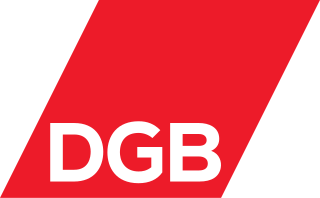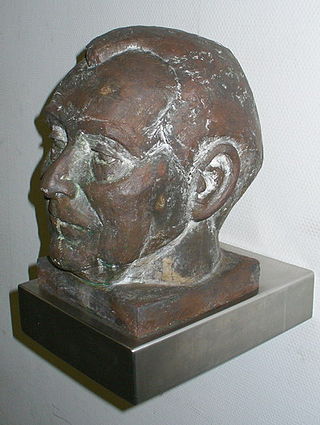Related Research Articles

IG Metall is the dominant metalworkers' union in Germany, making it the country's largest union as well as Europe's largest industrial union. Analysts of German labor relations consider it a major trend-setter in national bargaining.

The German Trade Union Confederation is an umbrella organisation for eight German trade unions, in total representing more than 6 million people. It was founded in Munich, 12 October 1949.

The IG Bauen-Agrar-Umwelt is a trade union in Germany with a membership of 350,000. It is the fourth largest of eight industrial affiliates of the DGB. IG BAU is active in the sectors of construction and engineering, building materials, building cleaning, facility management, gardening, forestry and agriculture. Since 2013 Robert Feiger has been the president of IG BAU.

The Gewerkschaft der Polizei is a trade union in Germany. It represents 181,000 police employees, and is one of eight industrial affiliations of the German Confederation of Trade Unions (DGB). The GdP is one of the three trade unions for police employees in Germany, the other two being the Deutsche Polizeigewerkschaft - affiliated with the German Civil Service Federation - and the Bund Deutscher Kriminalbeamter, which is exclusively for members of the Kriminalpolizei.
Dieter Schulte was a German trade union leader. He was chairman of the German Confederation of Trade Unions (DGB) from 1994 to 2002.
Trade unions in Germany have a history reaching back to the German revolution in 1848, and still play an important role in the German economy and society.
The General Commission of German Trade Unions was an umbrella body for German trade unions during the German Empire, from the end of the Anti-Socialist Laws in 1890 up to 1919. In 1919, a successor organisation was named the Allgemeiner Deutscher Gewerkschaftsbund, and then in 1949, the current Deutscher Gewerkschaftsbund was formed.
Hermann Nuding was a German politician, political party official (KPD) and, after 1945, an opponent of German re-armament.
Werner Hansen was a German Social democratic politician and trades unionist. After 1933 he stayed in Germany for several years undertaking illegal resistance work, and emigrating only in 1937. He was able to return and resume his trades union career in 1945.

Willi Bleicher was one of the best known and, according to at least one source, one of the most important and effective German trades union leaders of the post-war decades.

Otto Brenner was a German trades unionist and politician. Between 1956 and 1972 he was the leader of the powerful IG Metall (Industrial Union of Metalworkers).
The Chemical, Paper and Ceramic Union was a trade union representing chemical, oil refinery, paper, rubber, ceramics, glass and plastics workers in West Germany.

Konrad Carl is a German former trade union leader.
Arnold Gohr was a German clerical worker who became a trade unionist and activist. After 1945 he entered mainstream politics in East Berlin. As the Soviet occupation zone evolved into a Soviet sponsored one-party dictatorship, he never joined the ruling party, remaining instead a leading "collaborationist" member of the eastern version of the Christian Democratic Union. He became a party chairman and served between 1948 and 1958 as "deputy lord mayor" of Berlin, a period during which the increasingly divided city's constitutional status and future were contentious and ambiguous on a number of different levels.
The Horticulture, Agriculture and Forestry Union was a West German trade union representing agricultural and forestry workers.
Eugen Loderer was a German trade union leader.
The Industrial Union of Metal was a trade union representing workers in the metal and electronic industries in East Germany.
The Industrial Union of Chemicals, Glass and Ceramics was a trade union representing workers in various industries in East Germany.
The Industrial Union of Construction and Wood was a trade union representing construction and wood workers in East Germany.
References
- 1 2 3 4 Markovits, Andrei (1986). The Politics of the West German Trade Unions. Cambridge: Cambridge University Press. pp. 327–362. ISBN 0521305136.
- ↑ Ebbinghaus, Bernhard; Visser, Jelle (2000). Trade Unions in Western Europe Since 1945. Basingstoke: Palgrave Macmillan. p. 310. ISBN 0333771125.